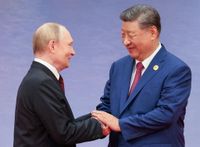World leaders converged in Tianjin, China, on August 31, 2025, for the annual Shanghai Cooperation Organization (SCO) summit—a gathering that showcased shifting alliances, ambitious economic visions, and a renewed focus on regional stability. With the participation of presidents, prime ministers, and diplomatic envoys from across Eurasia, the summit set the stage for high-stakes dialogue amid ongoing global turbulence.
Chinese President Xi Jinping opened the proceedings with a call to action, telling the assembled dignitaries that the SCO now bears a “greater responsibility” for safeguarding regional peace and stability, according to Xinhua. Xi underscored the organization’s mission to foster development and prosperity among its member states, emphasizing that the summit was not just a ceremonial affair but an opportunity to build consensus and stimulate real momentum in cooperation. The banquet he hosted on Sunday evening was more than a diplomatic formality—it was a statement of intent for a bloc that, in the eyes of China and Russia, increasingly serves as a counterweight to Western alliances like NATO.
Among the most watched guests was Indian Prime Minister Narendra Modi, making his first trip to China since 2018. Relations between the two giant neighbors have been fraught, particularly following the deadly 2020 clashes along their disputed Himalayan border. But in Tianjin, both sides struck a conciliatory tone. Modi, in his opening remarks, pointed to a "peaceful environment at the borders after disengagement" and stressed the importance of tranquility for the continued development of bilateral ties. “The interests of 2.8 billion people of both countries are linked to our cooperation. This will also pave the way for the welfare of the entire humanity,” Modi told Xi, as reported by India’s Ministry of External Affairs.
Xi, for his part, expressed hope that the summit would "further elevate" and "promote the sustained, healthy and stable development of bilateral relations." He urged that the border dispute should not define the entire China-India relationship, suggesting that economic development and partnership should take precedence. “As long as they remain committed to the overarching goal of being partners, not rivals, and providing development opportunities, not threats, China-India relations will flourish and move forward steadily,” Xi said, according to CCTV. Both countries pledged to restart border talks, resume issuing visas, and restore direct flights—a thaw that began last October when Modi and Xi met for the first time in five years at a summit in Russia.
Russian President Vladimir Putin arrived in Tianjin on the same day, continuing his diplomatic outreach in the region. Just a day earlier, Putin had given a written interview to Xinhua, highlighting the enduring partnership between Russia and China. He stated unequivocally that “Russia and China will continue working together to ensure the prosperity of the two great nations.” Putin praised Chinese President Xi Jinping’s May visit to Russia as a “resounding success,” noting the comprehensive joint statement and the signing of a substantial package of bilateral documents. “We reaffirmed the strategic choice of our peoples in favor of strengthening the traditions of good-neighborliness, friendship, and long-term, mutually beneficial cooperation,” Putin said in the interview.
The Russian leader also spoke about the symbolic significance of his visit, as he was set to join Xi in Beijing to commemorate the 80th anniversary of the end of World War II. “In Beijing, I will join the Chinese side to pay tribute to the shared act of heroism of our fathers, grandfathers and great-grandfathers, to honor the memory of those who sealed the brotherhood of the two peoples with their blood, defended the freedom and independence of the two states, and secured their right to sovereign development,” Putin stated. He emphasized that the peoples of the Soviet Union and China bore the brunt of the fighting and suffered the heaviest losses during the war, highlighting the historical bond underpinning current cooperation.
Putin’s presence at the summit was notable not just for his warm words but also for the geopolitical context: he faces an arrest warrant from the International Criminal Court (ICC) over the war in Ukraine, but China, not being a member of the ICC or the Rome Statute, provided a safe venue for the Russian leader to engage with global counterparts. The summit, the first since U.S. President Donald Trump returned to the White House for a second term, was widely seen as a show of Global South solidarity amid ongoing conflicts and economic disruptions caused by new tariffs and trade disputes.
Armenian Prime Minister Nikol Pashinyan also took the opportunity to meet with Putin on the sidelines of the summit. According to a press release from the Armenian Prime Minister’s Office, Pashinyan and Putin “attached importance to the meeting, emphasizing that it is an effective opportunity to discuss topical issues of bilateral relations and ways of their further development.” The leaders “highly valued the continuous and active dialogue between Armenia and Russia, highlighting both high-level personal contacts and interstate institutional cooperation.” Regional and international issues were also discussed, reinforcing the summit’s role as a platform for addressing not just economic but security concerns across Eurasia.
The summit’s agenda extended beyond security and diplomacy. Turkish President Recep Tayyip Erdogan met with Xi Jinping to discuss aligning Türkiye’s Middle Corridor project with China’s Belt and Road Initiative, aiming to deepen economic cooperation. The Middle Corridor seeks to establish a new trade route connecting Asia and Europe through the Caucasus and Türkiye, offering an alternative to traditional routes that pass through Russia. According to Türkiye’s Communications Directorate, Erdogan emphasized the need to take “joint steps to harmonize the Middle Corridor and the Belt and Road Initiative.”
Erdogan also highlighted the importance of supporting bilateral trade with investments to ensure “balance and sustainability,” and called for increased collaboration in digital technologies, energy, healthcare, and tourism. He reaffirmed Türkiye’s commitment to the “one-China policy” and described the bilateral relationship as having a “strategic dimension.” In an opinion piece for China’s People’s Daily, Erdogan positioned Türkiye as a bridge-building nation committed to resolving global crises through diplomacy, referencing Ankara’s role in the Black Sea Grain Initiative and recent peace talks in Istanbul.
Throughout the summit, the SCO’s growing ambitions were evident. Xi Jinping stressed that the organization must “build consensus among all parties and stimulate momentum in cooperation,” a sentiment echoed by leaders seeking alternatives to Western-dominated institutions. The summit’s focus on economic corridors, security partnerships, and diplomatic dialogue underscored the bloc’s evolving role as a driver of regional integration and a counterbalance to shifting global power dynamics.
As the Tianjin summit drew to a close, world leaders departed with new agreements, renewed commitments, and a sense that the SCO’s influence is only set to grow. Whether these pledges translate into lasting peace and prosperity remains to be seen, but the message from Tianjin was clear: in a world marked by uncertainty, dialogue and cooperation are more vital than ever.


